Unit 1 How can we become good learners Section B(教学课件)-初中英语人教版九年级全一册(共30页PPT,无素材)
文档属性
| 名称 | Unit 1 How can we become good learners Section B(教学课件)-初中英语人教版九年级全一册(共30页PPT,无素材) |
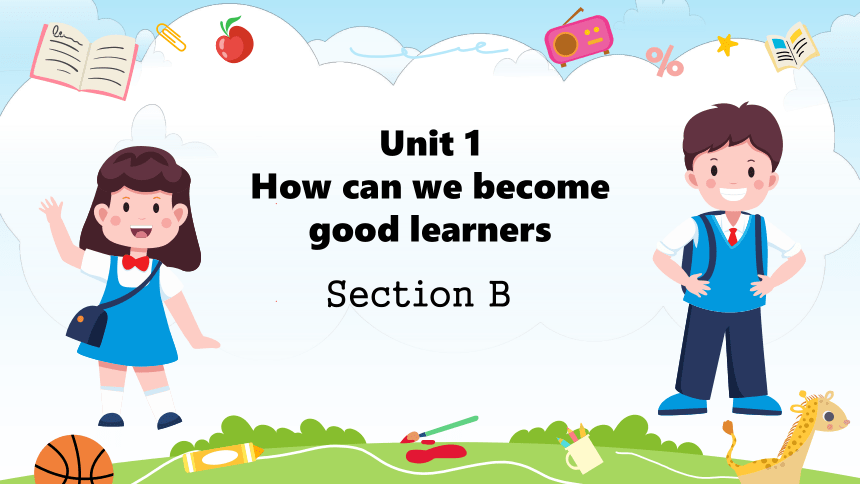
|
|
| 格式 | pptx | ||
| 文件大小 | 772.2KB | ||
| 资源类型 | 教案 | ||
| 版本资源 | 人教新目标(Go for it)版 | ||
| 科目 | 英语 | ||
| 更新时间 | 2024-09-03 00:00:00 | ||
图片预览

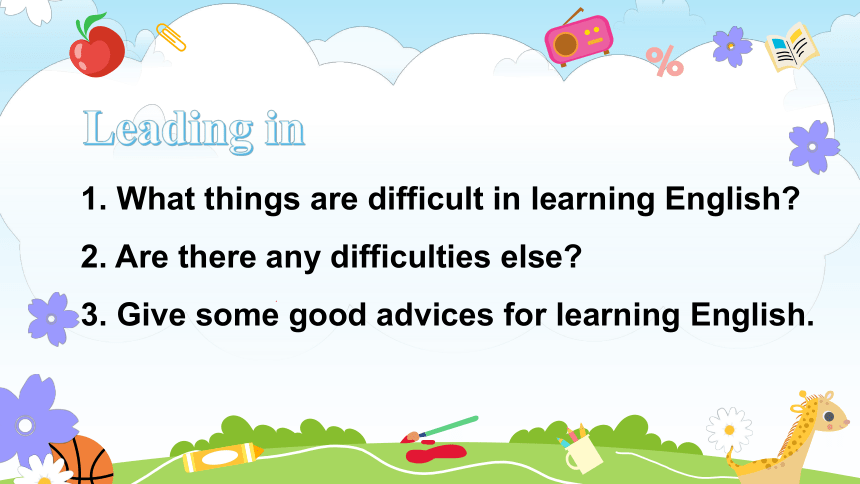
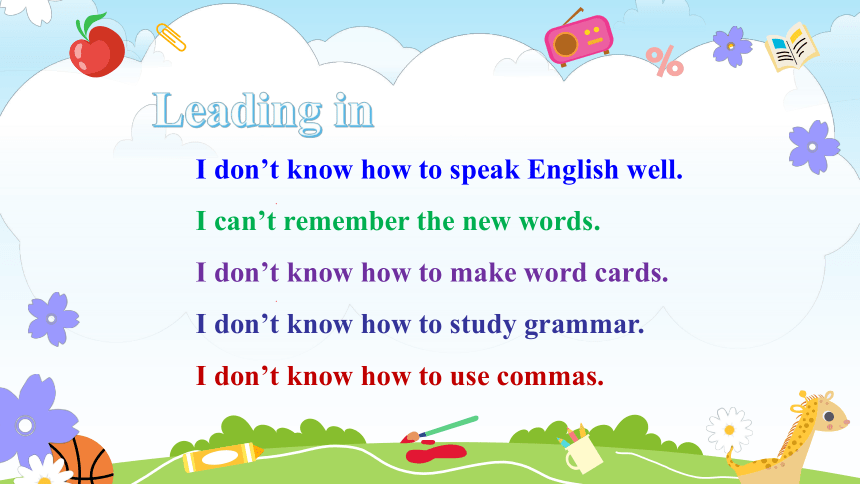
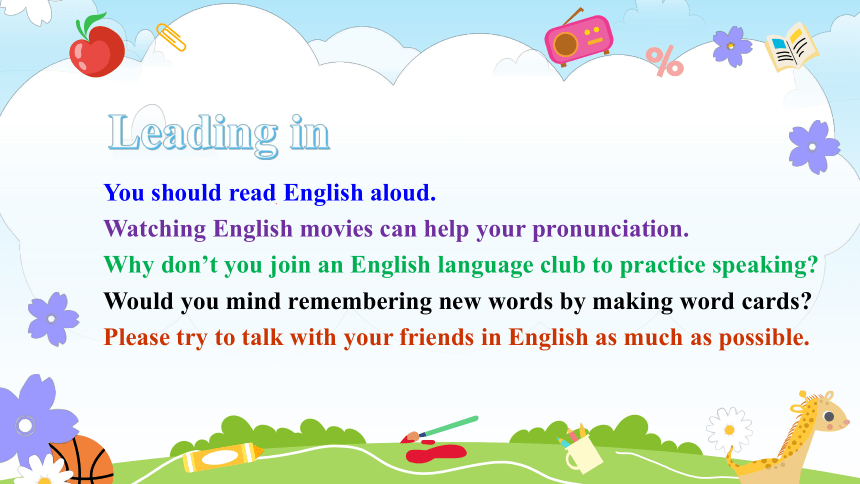
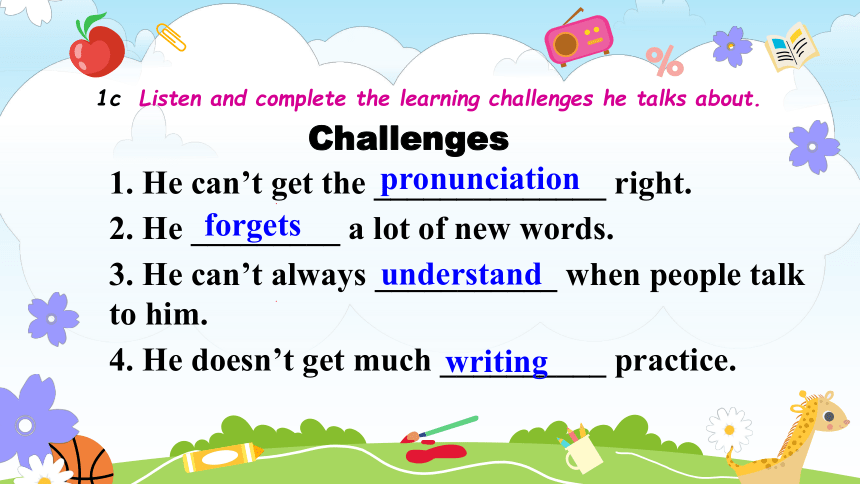
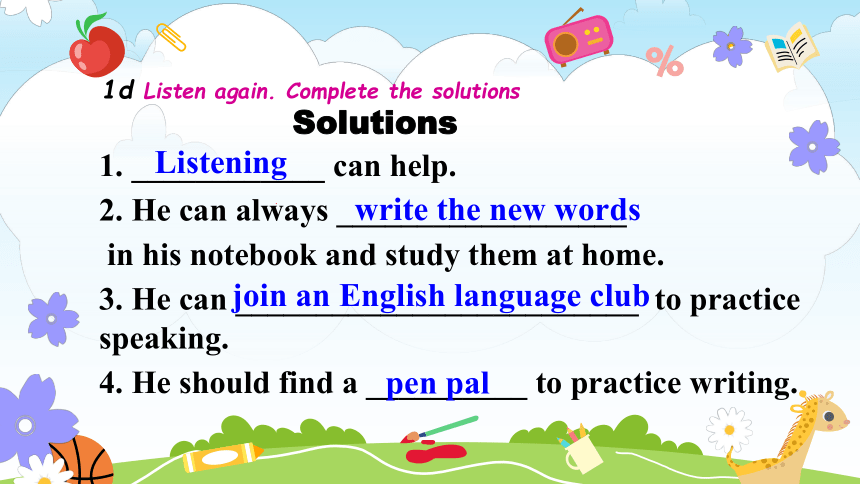
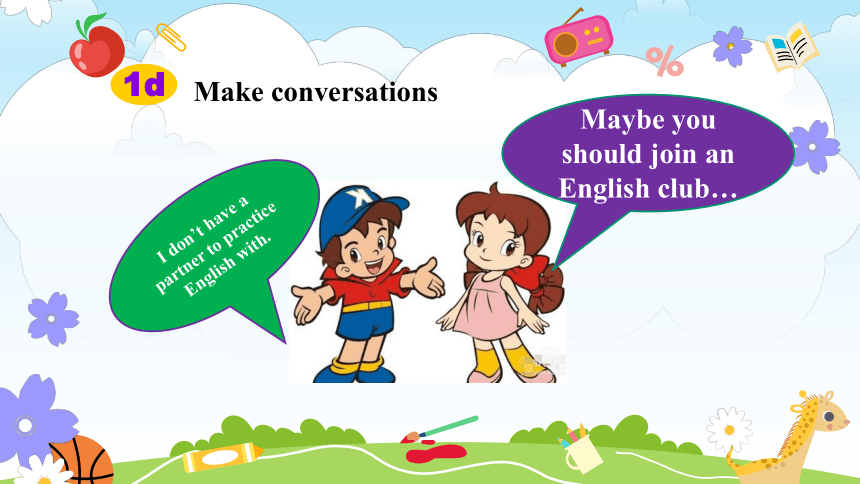
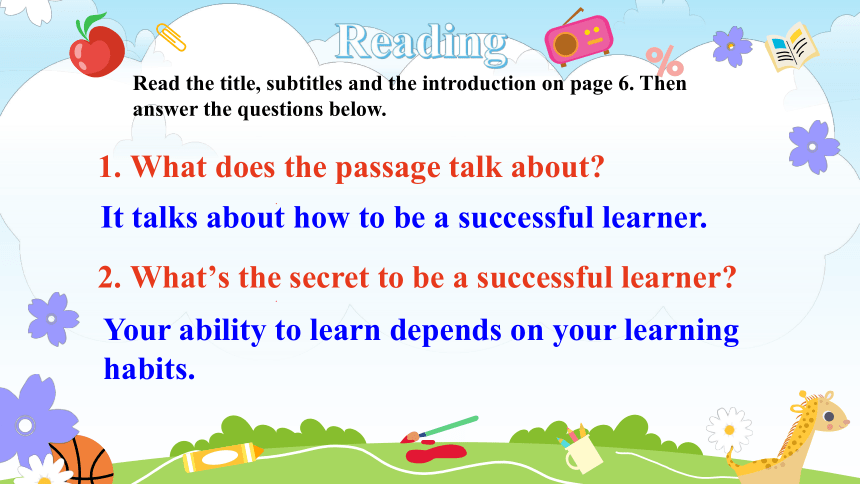
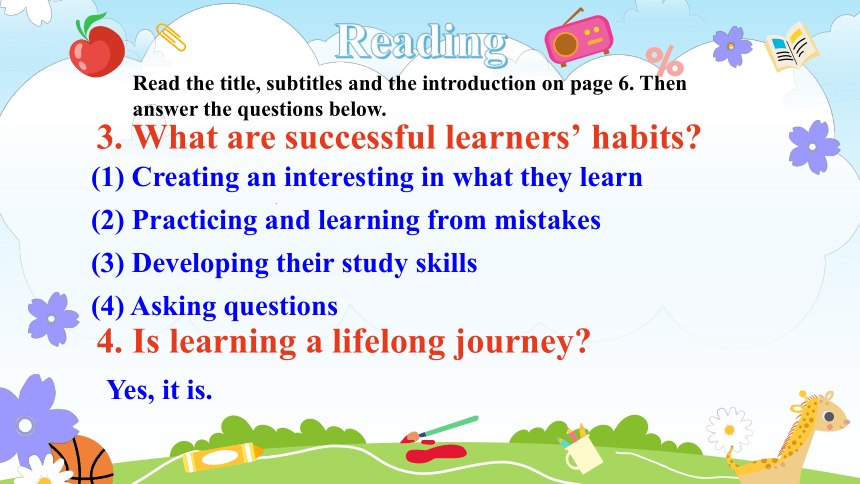
文档简介
(共29张PPT)
Unit 1
How can we become good learners
Section B
Leading in
1. What things are difficult in learning English
2. Are there any difficulties else
3. Give some good advices for learning English.
Leading in
I don’t know how to speak English well.
I can’t remember the new words.
I don’t know how to make word cards.
I don’t know how to study grammar.
I don’t know how to use commas.
Leading in
You should read English aloud.
Watching English movies can help your pronunciation.
Why don’t you join an English language club to practice speaking
Would you mind remembering new words by making word cards
Please try to talk with your friends in English as much as possible.
1c Listen and complete the learning challenges he talks about.
Challenges
1. He can’t get the ______________ right.
2. He _________ a lot of new words.
3. He can’t always ___________ when people talk to him.
4. He doesn’t get much __________ practice.
pronunciation
forgets
understand
writing
1d Listen again. Complete the solutions
Solutions
1. ____________ can help.
2. He can always __________________
in his notebook and study them at home.
3. He can _________________________ to practice speaking.
4. He should find a __________ to practice writing.
Listening
write the new words
join an English language club
pen pal
1d
Make conversations
I don’t have a partner to practice English with.
Maybe you should join an English club…
Reading
Read the title, subtitles and the introduction on page 6. Then answer the questions below.
What does the passage talk about
2. What’s the secret to be a successful learner
It talks about how to be a successful learner.
Your ability to learn depends on your learning habits.
Reading
Read the title, subtitles and the introduction on page 6. Then answer the questions below.
3. What are successful learners’ habits
4. Is learning a lifelong journey
(1) Creating an interesting in what they learn
(2) Practicing and learning from mistakes
(3) Developing their study skills
(4) Asking questions
Yes, it is.
Reading
2b Read the passage quickly and answer the question.
Which four habits of successful learners are mentioned
Creating an interest in what they learn.
Practicing and learning from mistakes.
Developing their study skills.
Asking questions.
Reading
2c Read again and answer the questions.
Does the writer think that everyone is born with the ability to learn well Do you agree Why or why not
Why is it a good idea to connect something you need to learn with something you are interested in
What do the sayings “Use it or lose it” and “Practice makes perfect” mean Do you agree with them
4. Do good learners learn from mistakes, or are they afraid of making mistakes
5. What study skills does the writer talk about Do you have those study skills
6. Do you agree that learning is a lifelong journey Why or why not
Reading
2c Read again and answer the questions.
1. The writer thinks that everyone is born with
the ability to learn well. I agree with the
writer that everyone is born with the ability
to learn, but learning well depends on the
learning habits that one develops.
2. This is because studies show that if you
are interested in something, your brain is
more active and it is easier for you to pay
attention to it for a long time. You will
also not get bored.
Reading
2c Read again and answer the questions.
3. Use it or lose it: If you stop doing something,
you will forget how to do it.
Practice makes perfect: If you do something
again and again, you will become very good at it.
4. They learn from mistakes, and they are not afraid of making mistakes.
5. Take notes by writing down key words or by drawing mind maps. Look for ways to review what has been learnt, e.g. read the notes every day or explain the information to another student.
6. Because every day brings something new. Everything that we learn becomes a part of us and change us.
Reading
2c Red again and answer the questions.
brain n. connect v. overnight adv.
attention n. review v. knowledge n.
ability n. active adj. wisely adv.
brain: A good way to train the brain is to do some math exercises every day.
Discussion
How to become a successful learner
Writing
Best ways to learn Reasons Examples
1. Being interested in what you do If you are interested in something, your brain will be more active and … If you like music, you can learn English by listening to English songs.
2. Reading English books
If you read English books that are well-written and show good use of the language, you can learn many new words and see how they are used.
If you like to read, you can learn English by reading well-known storybooks like Harry Potter or simplified versions of famous books like Pride and Prejudice.
Writing
Best ways to learn Reasons Examples
3. Watching English movies
If you watch English movies, you can practice listening to natural speech and you can use the storyline, body language, actions and facial expressions to improve your understanding.
If you like to watch movies, you can learn English by watching popular movies like Hunger Games and Kung Fu Panda.
Write a letter to your friend. Give him / her some advice about the best ways to learn English.
There are three good ways to…
I think you should ...
If you do this, you will ...
It is also a good idea to ... because ...
You could try to improve your English by ...
This will help you to ...
Writing
Show your composition!
Language points
1. Try to study and remember information bit by bit instead of waiting until the last minute to study everything at once.尽量一点一点地学习并且记住信息,而不是直到最后一分钟才马上学习一切
try to do sth.意为“尽力做某事”强调付出努力,但不一定成功
try doing sth.表示“尝试做某事”,含有看结果如何之意
instead of是介词短语,意为“代替;而不是”,后面可跟名词、代词或动词-ing 形式。作副词用,通常位于句末。位于句首时常用逗号与后面隔开。
Language points
2. Everything that you learn becomes a part of you and changes you, so learn wisely and learn well你所学的一切成为你的一部分而且改变了你,因此,要明智地学而且好好学。
这是一个复合句,其中“Everything that you learn”在句子中作主语,它本身是一个定语从句,先行词是 everything关系代词是 that。wisely 和 well 都是副词修饰动词 learn。
Language points
3. Even if you learn something well, you will forget it unless you use it.
即使你学得很好,但是如果你不用,你也将会忘了它。
Even if“即使,纵然”引导让步状语从句(=even though)
unless conj.除非,如果不;unless 是从属连词,引导条件状语从句,含有否定意义,相当于 if 条件状语从句的否定形式,所以unless = if not。
注意:unless 引导的条件状语从句和if引导的条件状语从句,与其他时同状语从句一样,从句中通带的后置定语时,从句用一般现在时代替一般将来时。
Vocabulary
1. increase
increase by...意为“增长了.....",by后常跟百分数、倍数等,表示增幅
increase to...意为“增长到.....”to后常跟具体数字
练习:Food prices _______ a lot.
increase
Vocabulary
2. ability
have ability to do sth.表示“做某事的能力”
练习::She has the ________ to speak French fluently.
ability
Vocabulary
3. depend on
其后可接名词、代词、动词-ing形式或从句。
既不能用于进行时态,也不能用于被动语态。
练习: Whether the game will be played ________ on the weather.
depend
Vocabulary
4. unless
引导条件状语从句,相当于if... not...
unless引导的从的通常放在主句之后,也可以放在主句之前。当主句用一般将来时或是祈使句时,unless从句用一般现在时
练习:Don't play ________ you finish your work.
unless
Vocabulary
5. be good at
be good at相当于 do well in...
其反义短语是 be bad for“对......有害”。
练习:He is ________ at singing and dancing.
good
Vocabulary
interested
6. be interested in
be interested in= take an interest in
interested意为“对......感兴趣的” 主语通常是人,且多用于be(get, feel,become)interested in 结构中
interesting是形容词,有主动意味,意为“有趣的”作表语时,主语通常是物;
作定语时,既可修饰人,也可修饰物
练习:Even before he was ten, he became ________ in science.
Thank you
Unit 1
How can we become good learners
Section B
Leading in
1. What things are difficult in learning English
2. Are there any difficulties else
3. Give some good advices for learning English.
Leading in
I don’t know how to speak English well.
I can’t remember the new words.
I don’t know how to make word cards.
I don’t know how to study grammar.
I don’t know how to use commas.
Leading in
You should read English aloud.
Watching English movies can help your pronunciation.
Why don’t you join an English language club to practice speaking
Would you mind remembering new words by making word cards
Please try to talk with your friends in English as much as possible.
1c Listen and complete the learning challenges he talks about.
Challenges
1. He can’t get the ______________ right.
2. He _________ a lot of new words.
3. He can’t always ___________ when people talk to him.
4. He doesn’t get much __________ practice.
pronunciation
forgets
understand
writing
1d Listen again. Complete the solutions
Solutions
1. ____________ can help.
2. He can always __________________
in his notebook and study them at home.
3. He can _________________________ to practice speaking.
4. He should find a __________ to practice writing.
Listening
write the new words
join an English language club
pen pal
1d
Make conversations
I don’t have a partner to practice English with.
Maybe you should join an English club…
Reading
Read the title, subtitles and the introduction on page 6. Then answer the questions below.
What does the passage talk about
2. What’s the secret to be a successful learner
It talks about how to be a successful learner.
Your ability to learn depends on your learning habits.
Reading
Read the title, subtitles and the introduction on page 6. Then answer the questions below.
3. What are successful learners’ habits
4. Is learning a lifelong journey
(1) Creating an interesting in what they learn
(2) Practicing and learning from mistakes
(3) Developing their study skills
(4) Asking questions
Yes, it is.
Reading
2b Read the passage quickly and answer the question.
Which four habits of successful learners are mentioned
Creating an interest in what they learn.
Practicing and learning from mistakes.
Developing their study skills.
Asking questions.
Reading
2c Read again and answer the questions.
Does the writer think that everyone is born with the ability to learn well Do you agree Why or why not
Why is it a good idea to connect something you need to learn with something you are interested in
What do the sayings “Use it or lose it” and “Practice makes perfect” mean Do you agree with them
4. Do good learners learn from mistakes, or are they afraid of making mistakes
5. What study skills does the writer talk about Do you have those study skills
6. Do you agree that learning is a lifelong journey Why or why not
Reading
2c Read again and answer the questions.
1. The writer thinks that everyone is born with
the ability to learn well. I agree with the
writer that everyone is born with the ability
to learn, but learning well depends on the
learning habits that one develops.
2. This is because studies show that if you
are interested in something, your brain is
more active and it is easier for you to pay
attention to it for a long time. You will
also not get bored.
Reading
2c Read again and answer the questions.
3. Use it or lose it: If you stop doing something,
you will forget how to do it.
Practice makes perfect: If you do something
again and again, you will become very good at it.
4. They learn from mistakes, and they are not afraid of making mistakes.
5. Take notes by writing down key words or by drawing mind maps. Look for ways to review what has been learnt, e.g. read the notes every day or explain the information to another student.
6. Because every day brings something new. Everything that we learn becomes a part of us and change us.
Reading
2c Red again and answer the questions.
brain n. connect v. overnight adv.
attention n. review v. knowledge n.
ability n. active adj. wisely adv.
brain: A good way to train the brain is to do some math exercises every day.
Discussion
How to become a successful learner
Writing
Best ways to learn Reasons Examples
1. Being interested in what you do If you are interested in something, your brain will be more active and … If you like music, you can learn English by listening to English songs.
2. Reading English books
If you read English books that are well-written and show good use of the language, you can learn many new words and see how they are used.
If you like to read, you can learn English by reading well-known storybooks like Harry Potter or simplified versions of famous books like Pride and Prejudice.
Writing
Best ways to learn Reasons Examples
3. Watching English movies
If you watch English movies, you can practice listening to natural speech and you can use the storyline, body language, actions and facial expressions to improve your understanding.
If you like to watch movies, you can learn English by watching popular movies like Hunger Games and Kung Fu Panda.
Write a letter to your friend. Give him / her some advice about the best ways to learn English.
There are three good ways to…
I think you should ...
If you do this, you will ...
It is also a good idea to ... because ...
You could try to improve your English by ...
This will help you to ...
Writing
Show your composition!
Language points
1. Try to study and remember information bit by bit instead of waiting until the last minute to study everything at once.尽量一点一点地学习并且记住信息,而不是直到最后一分钟才马上学习一切
try to do sth.意为“尽力做某事”强调付出努力,但不一定成功
try doing sth.表示“尝试做某事”,含有看结果如何之意
instead of是介词短语,意为“代替;而不是”,后面可跟名词、代词或动词-ing 形式。作副词用,通常位于句末。位于句首时常用逗号与后面隔开。
Language points
2. Everything that you learn becomes a part of you and changes you, so learn wisely and learn well你所学的一切成为你的一部分而且改变了你,因此,要明智地学而且好好学。
这是一个复合句,其中“Everything that you learn”在句子中作主语,它本身是一个定语从句,先行词是 everything关系代词是 that。wisely 和 well 都是副词修饰动词 learn。
Language points
3. Even if you learn something well, you will forget it unless you use it.
即使你学得很好,但是如果你不用,你也将会忘了它。
Even if“即使,纵然”引导让步状语从句(=even though)
unless conj.除非,如果不;unless 是从属连词,引导条件状语从句,含有否定意义,相当于 if 条件状语从句的否定形式,所以unless = if not。
注意:unless 引导的条件状语从句和if引导的条件状语从句,与其他时同状语从句一样,从句中通带的后置定语时,从句用一般现在时代替一般将来时。
Vocabulary
1. increase
increase by...意为“增长了.....",by后常跟百分数、倍数等,表示增幅
increase to...意为“增长到.....”to后常跟具体数字
练习:Food prices _______ a lot.
increase
Vocabulary
2. ability
have ability to do sth.表示“做某事的能力”
练习::She has the ________ to speak French fluently.
ability
Vocabulary
3. depend on
其后可接名词、代词、动词-ing形式或从句。
既不能用于进行时态,也不能用于被动语态。
练习: Whether the game will be played ________ on the weather.
depend
Vocabulary
4. unless
引导条件状语从句,相当于if... not...
unless引导的从的通常放在主句之后,也可以放在主句之前。当主句用一般将来时或是祈使句时,unless从句用一般现在时
练习:Don't play ________ you finish your work.
unless
Vocabulary
5. be good at
be good at相当于 do well in...
其反义短语是 be bad for“对......有害”。
练习:He is ________ at singing and dancing.
good
Vocabulary
interested
6. be interested in
be interested in= take an interest in
interested意为“对......感兴趣的” 主语通常是人,且多用于be(get, feel,become)interested in 结构中
interesting是形容词,有主动意味,意为“有趣的”作表语时,主语通常是物;
作定语时,既可修饰人,也可修饰物
练习:Even before he was ten, he became ________ in science.
Thank you
同课章节目录
- Unit 1 How can we become good learners.
- Section A
- Section B
- Unit 2 I think that mooncakes are delicious!
- Section A
- Section B
- Unit 3 Could you please tell me where the restroom
- Section A
- Section B
- Unit 4 I used to be afraid of the dark.
- Section A
- Section B
- Unit 5 What are the shirts made of?
- Section A
- Section B
- Review of Units 1-5
- Unit 6 When was it invented?
- Section A
- Section B
- Unit 7 Teenagers should be allowed to choose their
- Section A
- Section B
- Unit 8 It must belong to Carla.
- Section A
- Section B
- Unit 9 I like music that I can dance to.
- Section A
- Section B
- Unit 10 You're supposed to shake hands.
- Section A
- Section B
- Review of Units 6-10
- Unit 11 Sad movies make me cry.
- Section A
- Section B
- Unit 12 Life is full of the unexpected
- Section A
- Section B
- Unit 13 We're trying to save the earth!
- Section A
- Section B
- Unit 14 I remember meeting all of you in Grade 7.
- Section A
- Section B
- Review of Units 11-14
